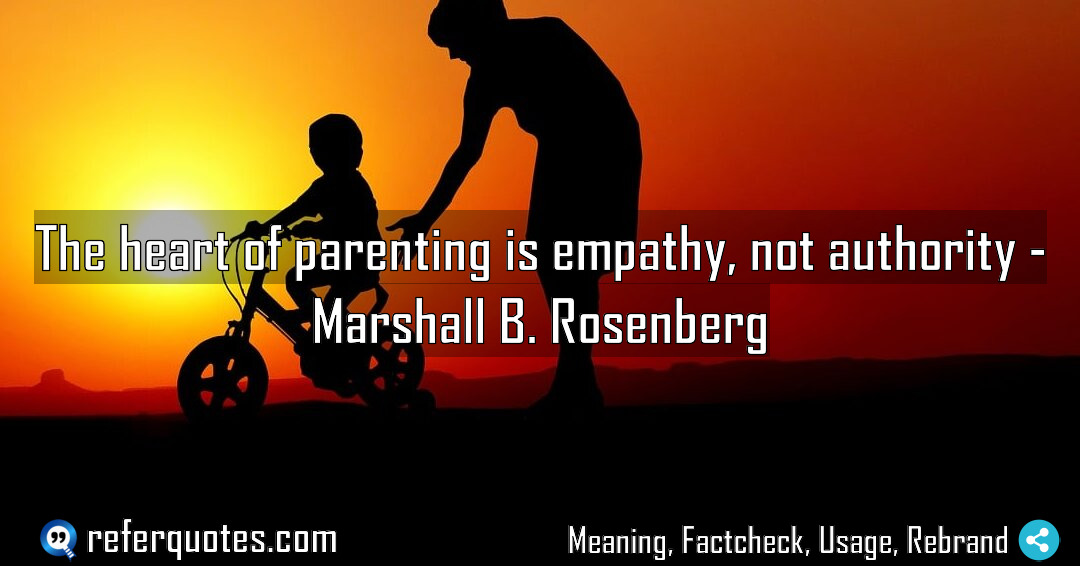
You know, the heart of parenting is empathy really flips the script on traditional parenting. It’s about connecting with your child’s feelings first, not just laying down the law. This approach builds trust and cooperation from the inside out.
Share Image Quote:
Table of Contents
Meaning
This quote argues that the most effective and compassionate foundation for raising children isn’t control, but a deep, genuine understanding of their inner world.
Explanation
Let me break it down for you. For years, we’ve been sold this idea that parenting is about being the boss, the authority figure who’s always in control. But what Rosenberg is saying—and what I’ve seen work time and again—is that when you lead with empathy, when you truly try to understand the why behind the behavior, the need for heavy-handed authority just… melts away.
It’s a shift from being a manager of behavior to a partner in their emotional development. You’re not permissive; you’re powerfully connected. And that connection is what guides them, not fear.
Quote Summary
Reading Level64
Aesthetic Score88
Origin & Factcheck
This is straight from Marshall B. Rosenberg’s 2005 book, Raising Children Compassionately. It’s a core tenet of his Nonviolent Communication (NVC) framework. You sometimes see similar sentiments floating around, but this specific, powerful phrasing is uniquely his.
Attribution Summary
Where is this quotation located?
| Quotation | The heart of parenting is empathy, not authority |
| Book Details | Publication Year/Date: 2004; ISBN/Unique Identifier: 9781892005140; Last edition: PuddleDancer Press, 1st Edition, 48 pages. |
| Where is it? | Chapter: Parenting from the Heart, Approximate page from 2004 edition |
Context
Rosenberg was writing this as an antidote to the classic, punitive “do it because I said so” model. He was placing this idea squarely within his NVC method, which focuses on observing without judgment, identifying feelings and needs, and making clear requests. It’s a whole system built around this empathetic heart.
Usage Examples
So how does this look in the wild? Let’s say your kid is having a meltdown in the supermarket. The authority response is, “Stop crying right now or we’re leaving!” The empathy response gets down on their level and says, “You’re really frustrated right now, huh? You wanted that candy and I said no. That’s hard.” You’re not giving in, you’re connecting.
Or with a teenager who’s slamming doors. Instead of “Don’t you dare slam that door!”, you might try later, “Wow, you must have been really angry about something to slam the door like that. Want to talk about it?” It completely changes the dynamic.
This is gold for exhausted parents stuck in power struggles, educators dealing with classroom dynamics, and honestly, anyone in a leadership role. It reframes the entire relationship.
To whom it appeals?
Share This Quote Image & Motivate
Motivation Score85
Popularity Score90
Shareability Score91
FAQ
Question: But doesn’t this just mean letting my kids walk all over me?
Answer: That’s the biggest misconception. Empathy isn’t permissiveness. It’s about understanding the feeling behind the action, not necessarily approving of the action itself. You still set boundaries, but you do it with connection.
Question: How do I even start using this? It feels unnatural.
Answer: Start small. Pick one frustrating moment this week and just try to name the feeling you think your child is having. “You look disappointed.” or “That seemed really frustrating for you.” That’s it. That’s the start. It gets easier, I promise.
Question: Is this only for little kids?
Answer: Absolutely not. In some ways, it’s even more powerful with teenagers. When they see you’re trying to understand their complex world, instead of just judge it, it builds a bridge that authority alone could never create.
Similar Quotes
Compassionate parenting transforms control into connection is one of those deceptively simple ideas that completely reframes the parent-child dynamic. It shifts the entire goal of your interactions from managing behavior…
You know, “Compassionate parenting is not about being nice” is such a game-changer. It completely reframes what it means to be a good parent, moving from performance to genuine connection.…
Empathy is the most powerful form of love we can offer because it’s not about fixing. It’s about truly connecting with a child’s world, which builds a foundation of trust…
Empathy is the most precious gift you can offer a child because it’s the foundation for everything else. It builds connection, teaches emotional intelligence, and shows them they’re truly seen.…
You know, when Marshall Rosenberg said “Children need empathy, not evaluation,” he hit on something so fundamental. It’s a game-changer for how we connect with kids, shifting our focus from…
